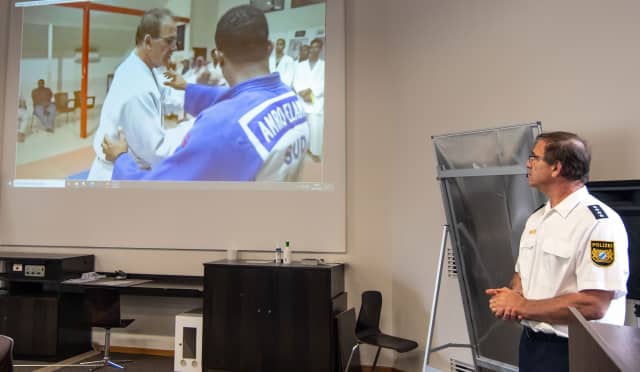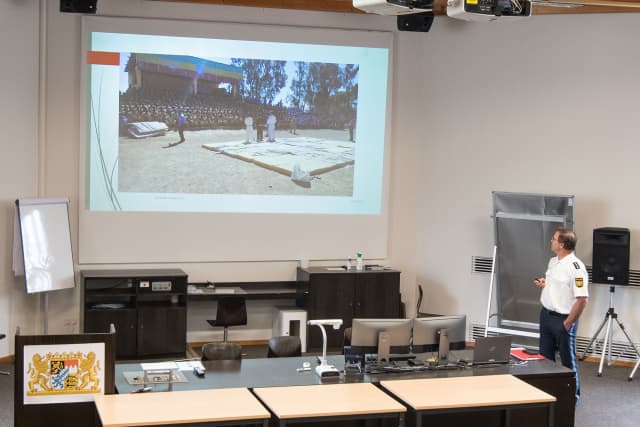At the invitation of Monsignor Andreas Simbeck, Dean of the Bavarian State Police, Johannes Daxbacher, Head of the IJF Police Commission, was invited as a speaker. A specialist in self-defence, he presented the connection between judo and police values and explained them using numerous examples and experiences from home and abroad. Daxbacher repeatedly linked international judo values such as courtesy, courage, honesty, honour, modesty, respect, self-control and friendship, with the requirements of daily police work.
Daxbacher, a former athlete of the Bavarian police was involved in the working group Personality Development in Police Training of the Bavarian riot police many years ago. In particular, the area of ‘awareness of values in sport and self-defence’ led to the design of the police values. These were formulated as humanity, personal responsibility, independence, helpfulness, teamwork, commitment, courage, compliance with the law, risk awareness, self-control, politeness, respectful behaviour and openness. A broad transfer of values is also possible through sport. This happens almost every day in any training session, whether alone or in a group. This topic is also of great interest to the German Police Sports Board (DPSK).
Sport per se has an enormous impact on personality by default due to compliance with rules, the active and passive ability to criticise, hygiene, dealing with victory and defeat and even realistic self-assessment. If you then take the Japanese philosophical approach to never give up, be it when running, when you want to give up on the first climb or when you are behind in a sports game, this can also be value-forming. This transfer is also valid for everyday work, for example, when tenaciously prosecuting crimes, patiently speaking to a confused person or when searching for a missing person in impassable terrain.
Daxbacher, who works as a volunteer in the German Judo Federation as a Judo for Peace speaker, made another comparison with sport with the term ‘decency regulation.’ He sees the role of superiors, who are also coaches or those responsible for clubs or associations, as the basis for fair and transparent manners, a more pleasant training and working atmosphere and thus also a significantly better sporting satisfaction and performance.
The final question from the auditorium, "whether the police still need chaplains," was answered by the judo teacher as follows, “In my view, the police need you all! This is not about legal or tactical skills. However, we need real professionals and their expertise when dealing with needs and worries that affect us all or the soul. That is you.
When dealing with people, with their mental suffering due to tragic missions, their own mistakes, internal conflicts, etc., only a real professional can help. In sports, this is a qualified trainer or sports psychologist. The perspective outside of the police organisation and trust in the confidentiality of a police chaplain is immensely important.”


